AI in the Packaging Market Valued at USD 7,337 Million Boom by 2033
Introduction
The Global AI in the Packaging Market is on a trajectory of robust growth, with expectations to expand from USD 2,679 million in 2023 to an impressive USD 7,337 million by 2033. This significant growth reflects the increasing integration of artificial intelligence technologies in various packaging processes. The market is anticipated to experience a robust compound annual growth rate (CAGR) of 11.26% from 2024 to 2033, indicating a strong upward trend fueled by innovation and evolving consumer demands.
Read also: AI and the Future of the Packaging Industry
In 2023, the AI in the Packaging Market saw North America emerge as a dominant force, securing over a 38% share. The region’s market demand was robust, valued at approximately US$ 1,018 million. This significant valuation highlights the extensive adoption and integration of AI technologies across various packaging applications, from automated assembly lines to advanced quality control systems.
These projections indicate that this market segment is set to expand considerably in the coming years.The growing emphasis on sustainability and efficiency in packaging processes, coupled with the push for more personalized consumer experiences, is driving this anticipated growth.
AI in the Packaging involves the integration of artificial intelligence technologies to enhance packaging processes across various industries. This integration aids in automating operations, improving design and customization, enhancing quality control, and ensuring sustainability. AI systems in packaging can predict maintenance needs, optimize material usage, and streamline supply chain logistics, leading to significant cost reductions and increased efficiency.
AI also plays a crucial role in developing smart packaging that extends shelf life, improves safety, and enhances the consumer unboxing experience. The market is expanding due to increasing demand for sustainable practices and personalized packaging solutions, driven by consumer preferences and stringent regulatory standards.
As we look towards the future, the AI in the Packaging Market is poised for rapid expansion, potentially reaching significant market values by 2033. Businesses are investing in AI to stay competitive, offering innovative solutions that meet the evolving demands of the market and regulatory environment.
Key Takeaways reveals that in 2023, the machine learning segment held a dominant market position, capturing over 47% of the market share.This leadership stems from machine learning’s pivotal role in enhancing operational efficiencies within the packaging industry.
The packaging design and customization segment was the market leader in 2023, holding more than 33% of the total market share. This segment’s dominance is primarily driven by the growing demand for personalized and innovative packaging solutions as consumers increasingly seek unique and customized products.
The food and beverage segment captured a significant share of over 29% in 2023, reflecting its dominant position in the market. AI plays a critical role in addressing unique challenges faced by this sector, such as ensuring product safety, tracking freshness, and managing efficient distribution.
In 2023, North America maintained a dominant market position, capturing over 38% of the share. This dominance is attributed to robust technological infrastructure, high adoption rates of advanced technologies, and stringent regulatory standards related to Industry and Consumer packaging. This trajectory suggests a dynamic and evolving role for AI in transforming North America’s packaging industry landscape.
According to a report by Refine PACKAGING, AI is at the forefront of waste technology trends, significantly supporting the U.S. EPA’s objectives. It is instrumental in achieving a projected 50% recycling rate by 2030 by meticulously tracking packaging materials from their inception through to recycling. AI identifies improvement opportunities and places a strong emphasis on sustainability, effectively making it a core aspect of its operations.
Growth Factors
The AI in the Packaging Market is expanding rapidly due to several growth factors such as the emphasis on sustainability, companies are leveraging AI to design more eco-friendly packaging by minimizing material waste and optimizing logistics to reduce carbon footprints.
As global markets grow and consumer expectations rise, companies are under pressure to speed up packaging operations while maintaining accuracy and quality. AI helps by optimizing workflows and predicting potential disruptions, thus enhancing operational efficiency.
Market Demand
The demand for AI in the packaging market is fueled by the need for faster, more efficient, and customizable packaging solutions. Consumers are increasingly looking for personalized products and experiences . AI facilitates this in packaging by enabling mass customization. This can range from personalized labels to packaging that adapts based on consumer interaction data.
Increasingly stringent regulations regarding packaging safety and sustainability standards are pushing companies to adopt AI. This AI systems can ensure compliance more efficiently by tracking and adapting to new regulations automatically which further increases the demand in this market
Opportunities and Expansion
Varied Opportunities are found in areas such as smart packaging, where AI can enhance tracking, security, and interactivity of packaging materials. AI-powered predictive analytics can also improve demand forecasting and inventory management, reducing overproduction and wastage. Moreover, companies can leverage AI to create more environmentally friendly packaging, a rising priority for businesses and consumers alike.
AI in the packaging market is set to expand globally as companies across industries increasingly adopt intelligent systems to stay competitive. Markets, especially in North America and Asia are ripe for AI-driven innovations due to the growing e-commerce sector. Continuous improvements in AI technologies with Packaging and Design as well as lowering costs, more businesses will embrace AI, pushing the market forward into new sectors and regions.
Emerging Trends
The packaging industry is rapidly evolving with the integration of Artificial Intelligence (AI), leading to several innovative trends. One of the key trends is the use of advanced robotics to enhance productivity, accuracy, and quality control. Robotics technology not only helps in reducing waste but also improves the sustainability of packaging processes.
Blockchain technology is also making significant inroads into the packaging sector, offering improved traceability and security. This technology ensures product safety and combats counterfeiting by providing immutable data storage, which enhances transparency across the supply chain.
Moreover, Immersive Technologies like Augmented Reality (AR) are being incorporated into packaging to create engaging and informative customer experiences. AR applications in packaging can display product information, promotional content, and interactive experiences directly to consumers, enhancing customer engagement and satisfaction
Top Use Cases
AI technologies are being employed in various innovative ways such as Machine learning and computer vision are extensively used for inspecting packaging materials for defects. This ensures high-quality standards are maintained across the production line, minimizing waste and improving product reliability.
AI algorithms are capable of designing customized packaging solutions that cater to specific consumer preferences and market demands. This not only helps in enhancing brand engagement but also allows for dynamic pricing and market responsiveness.
Major Challenges
Despite the growth potential, the AI-driven packaging market faces several challenges. One such major issue is the high cost of implementing AI technologies, which may deter smaller companies from adopting them. Furthermore, there’s a learning curve in integrating AI systems with existing operations, requiring skilled labor and new infrastructure investments. The rapid advancements in AI also create uncertainty, as companies may struggle to keep up with technological changes.
Business Benefits
AI is making significant strides in the packaging industry, offering substantial business benefits like AI in optimizing box designs, reducing material use, and improving structural integrity, which is critical for both performance and sustainability.
Advanced simulations facilitated by AI predict how packaging will hold up under various conditions, which reduces the need for costly physical prototypes and speeds up the design process.
AI-driven systems can automatically detect defects in packaging materials on production lines and predict when machinery will require maintenance. This proactive approach not only improves product quality but also reduces downtime and maintenance costs, ensuring smoother operations
Conclusion
In conclusion, The AI in the packaging market is concluding on a trajectory of rapid growth and innovation, profoundly impacting the industry through increased efficiency, enhanced sustainability, and elevated consumer engagement. Advanced machine learning algorithms and AI-driven tools are reshaping design processes, improving quality control, optimizing supply chain management, and pushing the boundaries of what’s possible in packaging with smart and interactive features.
This ongoing evolution promises not only to enhance operational efficiencies and consumer satisfaction but also to support global sustainability efforts, marking a significant shift towards more intelligent, responsive, and responsible packaging solutions.
About The Author
Ms. Manasi Pasalkar is Market Analyst at Market.us. With a professional certification in Market Analysis, she brings over a seasoned experience in market research and strategic consulting. Known for her meticulous approach, she has contributed to multiple projects, providing actionable insights that help businesses align their strategies with market trends and consumer demands. With a focus on driving digital transformation and enhancing connectivity, Manasi ensures that the company’s offerings meet the evolving needs of both industrial and commercial sector.





Leave a Reply